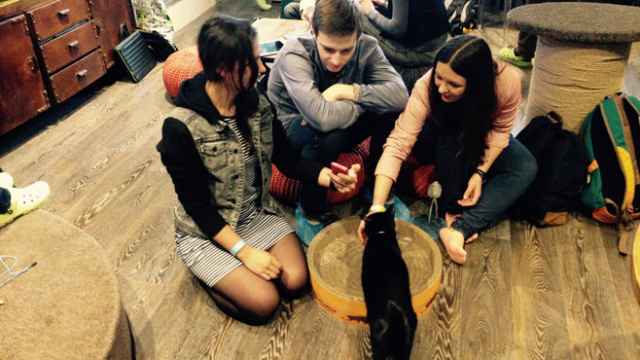As Ilya Smirnov tells the story, his family's decision to open an alpaca ranch in the Moscow Region came sort of on a whim.
"My two brothers, parents and I traveled through the United States and saw a lot of perfectly organized alpaca farms," Smirnov said, describing the beginnings of the Rossiiskiye Alpaki [Russian Alpacas] farm. "We loved the idea, bought alpacas and built our own ranch."
But the process was not so simple. Importing alpacas, a camel-like animal native to South America, to Russia, required the preparation of numerous documents as well as microchips containing pedigree information, which are required to transport alpacas abroad. It took the Smirnovs more than a year and a half to complete all the necessary procedures.
Finally, in 2012, 15 alpacas arrived in Krukovo from their birthplace in New Jersey to join the Smirnovs' menagerie, which already included huskies, cats, rabbits, turtles, quails, doves and goats.
The Smirnovs later sold some of the original alpacas, but others were born on the farm. Today the family has 12 alpacas.
Alpacatherapy
The farm is open on the weekends from 10:30 a.m.-7 p.m. Visitors are asked to make a 300 ruble ($5.50) donation to buy feed for the alpacas, who spend most of their time eating hay. The alpacas eat approximately 10 tons of hay per winter. The Smirnovs also feed them barley grown on the farm and German muesli.
In addition to welcoming regular visitors to their petting zoo, the Smirnovs have a special program that allows people with disabilities to spend time with the alpacas for free
"The interaction with alpacas we call 'alpacatherapy,'" Smirnov said. Alpaca therapy programs are common in the United States and Germany.
Guests to the farm can pet the alpacas and take photos with them. Alpacas are friendly, though a little shy. The best way to attract them is to hold a piece of apple in your hand. The alpacas then gently drag the fruit from your fingers with their soft lips.
"We have an ideal environment — it's enough space, we clean the stables every day and the Moscow region climate is alpaca-friendly," Smirnov said.
Alpacas, whose ancestors originated in the harsh climate of Andes Mountains of Peru, Bolivia, and Chile, have thick, fluffy wool coats that make it possible for them to live comfortably during the long Russian winters.
Every May, the Smirnovs shear their alpacas and invite visitors to come and watch the process. This year, the shearing took place May 23, 24 and 30th.
The Smirnovs store the wool in their barn, and someday hope to process and sell it.
"In the future, when we expand our farm, we plan to earn money by producing and selling alpaca wool and threads," Smirnov said.
Alpaca wool has very dense, high-quality fibers. Thread made from alpaca wool is valued at $30 for 100 grams.
Visitors to the farm can buy small portions of wool as a souvenir, along with refrigerator magnets with portraits of the alpacas for 100 rubles ($2) a piece.
"We don't get any profits from this farm, it's our hobby — we love animals and to bring joy to people!" Ilya Smirnov said.
To arrange a tour, call 903-298-8340. For more information, visit http://www.alpacainfo.ru/
A Message from The Moscow Times:
Dear readers,
We are facing unprecedented challenges. Russia's Prosecutor General's Office has designated The Moscow Times as an "undesirable" organization, criminalizing our work and putting our staff at risk of prosecution. This follows our earlier unjust labeling as a "foreign agent."
These actions are direct attempts to silence independent journalism in Russia. The authorities claim our work "discredits the decisions of the Russian leadership." We see things differently: we strive to provide accurate, unbiased reporting on Russia.
We, the journalists of The Moscow Times, refuse to be silenced. But to continue our work, we need your help.
Your support, no matter how small, makes a world of difference. If you can, please support us monthly starting from just $2. It's quick to set up, and every contribution makes a significant impact.
By supporting The Moscow Times, you're defending open, independent journalism in the face of repression. Thank you for standing with us.
Remind me later.





